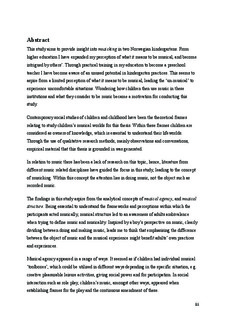| dc.description.abstract | This study aims to provide insight into musicking in two Norwegian kindergartens. From
higher education I have expanded my perception of what it means to be musical, and become intrigued by others’. Through practical training in my education to become a Preschool teacher I have become aware of an unused potential in kindergarten practices. This seems to aspire from a limited perception of what it means to be musical, leading the ‘un-musical’ to experience uncomfortable situations. Wondering how children then use music in these institutions and what they consider to be music became a motivation for conducting thisstudy.
Contemporary social studies of children and childhood have been the theoretical frames
relating to study children’s musical worlds for this thesis. Within these frames children are
considered as owners of knowledge, which is essential to understand their lifeworlds.
Through the use of qualitative research methods, mainly observations and conversations,
empirical material that this thesis is grounded in was generated.
In relation to music there has been a lack of research on this topic, hence, literature from
different music related disciplines have guided the focus in this study, leading to the concept of musicking. Within this concept the attention lies in doing music, not the object such as recorded music.
The findings in this study aspire from the analytical concepts of musical agency, and musikal structure. Being essential to understand the frameworks and perceptions within which the participants acted musically, musical structure led to an awareness of adults ambivalence when trying to define music and musicality. Inspired by a boy’s perspective on music, clearly dividing between doing and making music, leads me to think that emphasising the difference between the object of music and the musical experience might benefit adults’ own practices and experiences.
Musical agency appeared in a range of ways. It seemed as if children had individual musikal ‘toolboxes’, which could be utilised in different ways depending in the specific situation, e.g. creative pleasurable leisure activities, giving social power and for participation. In social interaction such as role play, children’s music, amongst other ways, appeared when establishing frames for the play and the continuous amendment of these. | nb_NO |
